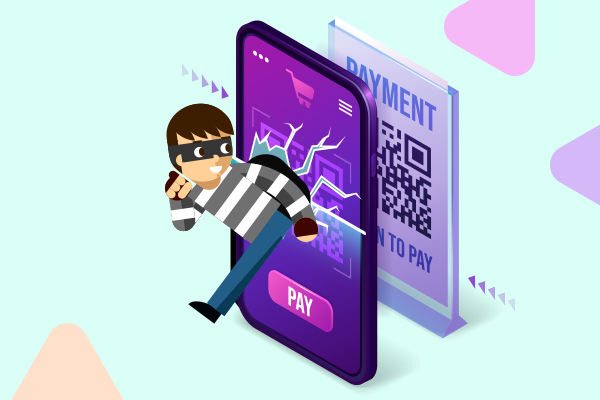Protect yourself from UPI Frauds

The digital age has brought a revolutionary way of conducting transactions, with the Unified Payments Interface (UPI) leading the change in India. UPI is an innovative system that enables seamless inter-bank transfers, providing individuals and businesses with the convenience of instant money transfer. Its seamless and speedy transaction system has made UPI one of the most preferred digital payment methods in the country.
As per data from the National Payments Corporation of India (NPCI), the system’s total transactions crossed the 4.6 billion mark in February 2022, amounting to a whopping Rs. 9.4 lakh crore. This is an impressive increase from the 2.3 billion transactions worth Rs. 4.3 lakh crore in February 2021.
However, the rise in digital transactions has led to a surge in fraud and scams, with UPI frauds being a particular cause for concern.
Types of UPI Frauds
UPI frauds come in various forms, each with its own unique way of duping people. Let’s look at some of the most common types of UPI frauds:
1. Phishing Scams: Fraudsters create fake websites or links that closely resemble genuine ones, with the intention of stealing sensitive information like UPI PIN, login credentials, and bank account details.
2. SIM Card Swapping: In this scam, the fraudster gains control of the victim’s UPI account by obtaining a duplicate SIM card of their phone number and requesting a reset of their UPI PIN or other banking credentials.
3. Fake Apps: Fraudsters create phony apps that look and function like legitimate banking or payment apps, but with the aim of stealing users’ login credentials and UPI PIN.
4. QR Code Scams: Scammers create fake QR codes that, when scanned, redirect users to phishing websites or prompt them to download malicious apps on their devices. These codes are often circulated via social media or messaging platforms.
5. Social Engineering Scams: In this type of fraud, fraudsters use psychological manipulation to trick people into revealing their UPI PIN or other sensitive information through phone calls, SMS, or emails.
6. Google Pay Scam/Money Received Scam: This involves receiving an unsolicited payment in your account and then receiving a call or message from the sender, claiming it was sent by mistake and requesting that you refund it to their number. However, falling for this trick can lead to your account getting hacked.
7. Remote Access Scams: Scammers use remote access software to gain control of the victim’s device, giving them access to sensitive information and enabling them to transfer money from their UPI account.
8. Malware Attacks: Fraudsters use malicious software or apps to infect the victim’s device and steal sensitive information like UPI PIN or banking credentials.
Tips to Stay Protected from UPI Frauds
The UPI frauds are becoming increasingly sophisticated and difficult to detect, therefore it’s crucial for users to stay vigilant and take necessary precautions to protect themselves.
- Password Protection: Use strong numeric passwords that are difficult to guess and change them regularly. Avoid using simple or easily guessable 4 or 6-digit numeric passwords like, “123456.”
- Trustworthy Sources: Only download UPI apps from official app stores like Google Play Store or Apple App Store with authentic ratings and reviews to reduce the risk of downloading fake apps. Do not download apps from unknown sources or click on suspicious links.
- Anti-Virus Software: Install and regularly update anti-virus software to protect your device from malware attacks. Malware can steal your sensitive information, including UPI PIN and banking credentials, and can lead to UPI frauds.
- Beware of Scams: Always be cautious of unsolicited calls, SMS, or emails that request your sensitive information or ask you to click on suspicious links. Do not share your UPI PIN or other sensitive information with anyone, and never click on links from unknown sources. If you suspect any fraudulent activity, report it to your bank immediately.
- Transaction Limits: Set transaction limits for your debit card (ATM, online, merchant), and monitor your transactions regularly to detect any suspicious activity. If you suspect fraud, contact your bank immediately and report the incident to the police.
Measures to Take if You’ve Been Scammed
In the unfortunate event that you fall victim to UPI fraud, it is essential to take immediate action to prevent further harm. Firstly, you should contact your bank’s customer care and inform them of the fraudulent transaction. Provide them with all the relevant information, such as the amount and date of the transaction. Secondly, file a complaint with the local police station and present all evidence that may aid their investigation.
It is also advisable to contact the UPI payment service provider, such as NPCI, and inform them of the fraudulent activity. This can help them block the fraudulent account and prevent further scams. Additionally, it is crucial to keep a record of all transactions, including the fraudulent one, as evidence for the bank and police.
Digital payments have become an integral part of our lives, making financial transactions more convenient and hassle-free. However, this convenience comes with the risk of UPI frauds and cybercrime. To safeguard yourself from such fraudulent activities, it is imperative to adopt necessary safety measures and always stay vigilant.
If you have been a victim, you can register a complaint immediately by dialing 1930 or visit the National Cybercrime Reporting Portal.

 Blog
Blog Blog
Blog



Comments
No comments yet.